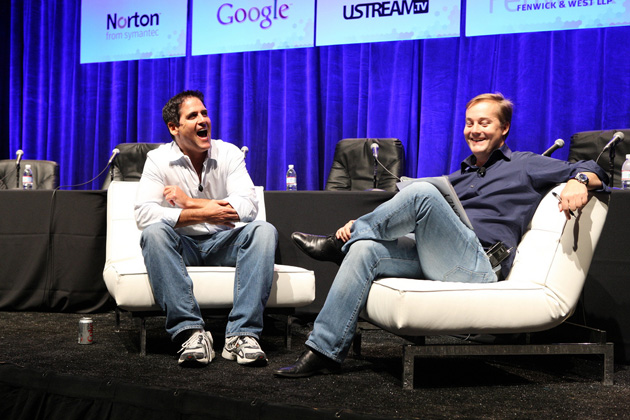by
Mark Hendrickson
To round out the day’s schedule at TechCrunch50 , Jason Calacanis
, Jason Calacanis interviewed Mark Cuban
interviewed Mark Cuban , the founder Broadcast.com, HDNet, and several other companies. He has also been an angel investor for several startups including SlideShare, Goowy, RedSwoosh, Box.net, Calacanis’ own Weblogs, Inc and Mahalo.
, the founder Broadcast.com, HDNet, and several other companies. He has also been an angel investor for several startups including SlideShare, Goowy, RedSwoosh, Box.net, Calacanis’ own Weblogs, Inc and Mahalo.
Below are our notes, which try to capture a fast-paced exchange that included Cuban’s entrepreneurial advice as well as his experience running sports franchises (the notes place emphasis, naturally, on the former).
Jason Calacanis (JS): What is this about? *Plays clip from Dancing with the Stars featuring Mark Cuban from last year*
featuring Mark Cuban from last year*
Mark Cuban (MC): You know, I’ve watched only one of my dances. I was so lucky to get through that.
JS: It was kind of shocking - you were actually good.
MC: I wouldn’t take it that far. So let’s change the subject..You know the one thing I did learn: how to do the ass shake in front of 25 million people
JS: Why did you do Dancing with the Stars anyway?
MC: It was just a challenge. It was something I didn’t know how to do, it was live, and it was athletic. And on top of that, I had just got my hip replaced. So I could either go through rehab or go dancing with my wife Kim
JS: You’ve had a pretty amazing career. Your advice has been extremely pragmatic throughout this conference. You’re not exactly associated with pragmatism, given the size of the Broadcast.com deal
MC: You don’t think it was pragmatic to take that deal? Our last quarter was $23M+ per quarter. More than $100M per year. More than YouTube. We got 23 M shares of Yahoo as part of the deal. It was like we got 200 M dollars in real Yahoo stock. People don’t understand that back then we were screaming with over 100 M uniques per day. We had advertising - not only prerolls but inserted advertising. We had a test with a Texas AM football game where we inserted an audio ad. We bought a company called Simple Net that was all about user generated content. We started on the corporate side because the consumer side didn’t have broadband yet. So we sat down with people like Michael Dell and recorded videos for the net. So if I seem like I’m a cynic with web video, it’s because this stuff is all 10 years old. We’re just going through all of it again after the bust
JC: I feel like you get an unfair wrap with all this. People don’t know you had multiple businesses before Broadband
MC: I did, and I “retired” when I was 30. My goal was to drink with as many people in as many countries as possible. I sold a company and all I wanted was a lifetime pass for American Airlines. They had them for $125,000 for two people. I used to go into bars and ask women if they wanted to go on trips. But then, one of my buddies at Goldman said we should start a hedge fund and three years later we sold if for a lot of money. I was still drinking and traveling when I was asked to try streaming Indiana basketball games over the internet. I was reluctant because I already had my FU money but I took a look and put up some of my money. My first business card had Vice President on it because I didnt want to work. Before you could do live streaming, we figured it out and did it from there.
JC: After Broadband, you’ve gotten even more active than before. Why are you doing all this now? Are all these projects for fun? Movies and basketball?
MC: I’m a competitive person. Business is a much more competitive sport than any real sport. It’s 24×7x365. I’m a business adrenaline junky. Once I didn’t have to pay the bills, the best challenges were to come up with stuff that people said couldn’t be done. So when I started HDNet, people thought that it was stupid - HD TVs would never go mainstream. People said that consumers couldn’t tell the difference between HD and regular TVs anyway. So I put my money where my mouth was. And then I took a look at the movie business. I’m not creative but it looked fun and could provide content for HDNet. Plus I thought there was a better way to sell movies. So we decided to make a film for $750,000. I like to look at industries I just know are messed up. Everyone’s looking in one direction and I look in the other. We started Magnolia Pictures for distribution with the idea that we could provide movies where and when people want them. All our DVDs are not copy protected. If you want to copy them, please go out and do that.
JC: So you have all these businesses - a movie production company, a cinema, Magnolia, HDNet. How is it all going?
MC: Landmark, HDNet, and Magnolia are all making money. 2929 Entertainment is not making money yet but will in about a year. In aggregate, making money. I think we’re going to save the independent film business. Right now there are 600+ independent films per year, about 100 get theatrical distribution, about 10 make money. The whole process is broken so why don’t we tweak it even more? We created Ultra VOD that takes buzz around movies and puts it out to cable video on demand before they hit theaters. Why would we do that? There are so many pay-per-view commercials because they work. VOD sales make money and promote a movie. We sell it at a premium and because the cable companies get half, they promote the hell out of them. If we do $0.5M even before it hits theaters, we’re doing well. We recover lots of our costs. All of this is just built for more. On the flip side, the only national theater chain that will play those movies is Landmark. The others refuse because of the prerelease.
JC: What about the festivals? Does it disqualify you to do prerelease?
MC: People say you can’t win Academy Awards with prereleased films but all you do is put it in the theaters once when no one will see it. Then you qualify. The guy who runs the theater association called me a “devil”. Someone else has called my strategy the worst thing to happen to movies. But independent film creators think I have something going.
JC: What do you think when you look at BitTorrent and all the movie downloads there? Any business opportunity there?
MC: You can’t really stop it. People with the time will do it but others won’t. Lots of people just download movies and never watch them. People often pay for stuff for the convenience.
JC: How long have you had the Mavericks?
MC: 8 years. I let Dirk Nowitsky do what he wanted to do. It got voted worse franchise in business right before a bought it. It was worth $285M when bought, but now it’s about twice that much. You can beat yourself against the wall and they’re like stop stop stop but now we know I’m right. I’m quieter now because people listen. Before no one would listen. We try to be reasonable with seat prices when we’re both good and bad, because who knows when you’ll suck and fans will revolt.
JC: Let’s talk about the disaster that is the Knicks…
MC: They’ll be better this year
JC: When you look at the franchise, how do…
MC: If there was a template for success in sports, everyone would follow it. You do the best you can and trust the people you trust. I’ve learned the number one job of a pro manager is not to win championships but to keep their job.
JC: The thing you’re probably most notorious for is the whole Steve Nash thing. Looking back on it, was it the wrong move or…?
MC: In hindsight it was the right move but it was sad. We’ve all had situations where we worked with someone and developed emotional relationships, and Steve Nash and I had fun. But thats the way it works, you move on. I was terrified when he left.
JC: Let’s talk about the blog for a second. You were an angel investor in Weblogs. You were one of the first major figures to get into blogging.
MC: You know there’s only so much time for spell checking. It’s either going to be brutal or youre going to do the same thing all the time. Its been 4.5 years since I started.
JC: Theres usually a relationship between how successful someone has been and how quiet they become.
MC: In the past people used to tell me to shut up a bit. But what I believe is to put out your opinion and let everyone else react. If I’m wrong I’m wrong. People are afraid to put our their opinions and get push back.

JC: You invented the word “splogs”..
MC: Yea I wanted to be the one to invent a word.
JC: You do a lot of investing. Two of my companies. How do you do your investments?
MC: I just trust the person. I dont make as many as I did now with the Cubs thing and HDnet. But id say 80 percent of the deals I’ve done I’ve never met the people. Whatever you can say in a meeting you can put in an email. If I have questions, Ill tell you via email. With RedSwoosh, we met once in Las Vegas and never again. Blake Rose from IceRocket, I wouldnt know him if I walked down the street, but I might have emails with him 5-10 emails a day.
JC: People ask me for your phone number and I dont even have it cause we dont talk on the phone
MC: I use a sidekick because of the keyboard
JC: Who’s the entrepreneur you respect most? Current or past?
MC: I guess Bill Gates. Larry Ellison I respect. You know, old school entrepreneurs, it was just diffferent. There was a different crede. I used to want to be profitable every month, before going IPO. But then later I accepted running at a loss. From the Netscape moving on, that’s what has happened since — the whole idea now is to get pageviews and then figure out a revenue model. I think entrepreneurs these days have been cheated because for them, its not about understanding how to make money. But when the money goes dry, you’re shit out of luck. When the bubble burst, 9 out of 10 businesses went away. With weblogs, our mantra was sales cures all. We used to talk about bottom line, not top line. It always came down to what you’re putting into your pocket. I want a cash-in-pocket strategy not an exit strategy.When you walk down these halls, you dont have people making money yet.
JC: I dont know if you’re Democratic, Republican, or Lbertarian, You hate politics, but how screwed up have the last couple of years been? How about the shape of the country?
MC: I dont think the country’s in bad shape because theres all this entrepreneurial spirit here and elsewhere. That’ll never stop. People talk about taxes but thats not relevant to the success and creation of businesses in general. But boy, everyone in Washington - old and proposed - is doing everything they can to screw things up. No one can turn around Yahoo yet alone the country. I’ll probably vote for the person that’ll do the least, stay out of the way.
JC: You see guys like Bloomberg doing a kick ass job. Do they ever approach you for politics?
MC: I think political people are afraid of me. Thats the loose canon thing. There’s a lot to like about Obama but his economic policy is ridiculous. He talks too much about spending until the cows come home.
JC: Whats the best piece of advice you can give a young entrepreneur?
MC: Ill tell you what I learned from Bobby Knight: everybody’s got the will to win but when it comes time to doing something, it’s always about someone else. Not many people have the will to prepare. You got to be willing to know your product and environment better than anybody. No matter what you do there is someone out there trying to kick your ass. You got to be the smartest guy in the room about your product. Then you need to have a revenue source. You need a company with a revenue to make money. Concept, competition, and where the money is — plus something you love doing. I’ve never had a day of work. When I die I want to come back as me.
Q&A
What do you do to educate yourself?
Pre-internet: stacks of books and magazines. I have PCweek magazines going back 10 years. I would read 2-3 hours per day of regular stuff.
Now online: I need a break because I spend so much time reading. If theres something I get into, I won’t stop. I read a lot of industry trade publications for cable now.
How do people reach you?
Send me an email and in three paragraphs or less, tell me about your business. Dont say you need an NDA or want a call. Just tell me how youre going to make money and how I’m going to add value. Give me a URL if you have a website, I’ll figure it out. 5% of the people will hear back from me.
What are you going to do with the Cubs?
I gotta buy them first. It just keeps getting more and more complicated. We’re in the process of due diligence. I have a group doing basic due diligence.
Can you talk about what’s fullfulling about businesses?
Winning, absorbing the journey and the destination. When all of it comes together, whether it’s something you started or took over, you get to look at yourself and everyone around you. Sports bonds families; different generations can talk together about sports. It’s the same within a business.
How do you pick a team for a startup?
I’ve always been a driver from a tech perspective so it’s been easy to find people who complement me. Finding someone who you trust and who complements you is important. It’s easier to find people you trust who are cheap and can be trained. Believing in the business is important too. The worst place to hire is the Silicon valley because everyone’s a hero in their own mind. There are great people everywhere you can find. The poeple I dont like to work with are people like me. I need people who can compliment my skill set, people who can do the nitty gritty with me. People who will be good verse look good.
What’s the biggest change you’ve made in your life that has changed your career?
Realizing I was a terrible employee. Getting fired for selling on commission rather than cleaning floors. Also, before you have kids and get a mortgage, thats the time to go after it. I cant tell you how many girlriends I’ve had that said “me or the business”, and I said “whats your name?”
How do you narrow down opportunities to the ones you get involved in?
You can drown in opportunity. We all have this aversion to finishing work because once you get into it, it gets mundane. Someone always seems to have a better idea. Unless I really ike something, I dont do it. I’m only ever a strategic investor.
Original here
![]()















 After extending the bail date 5 times, Cleveland police has announced the charges against OiNK administrator Alan Ellis.
After extending the bail date 5 times, Cleveland police has announced the charges against OiNK administrator Alan Ellis.


 Slipknot vocalist and frontman Corey Taylor has launched an attack on recording labels, saying that instead of spending their time chasing downloaders, they should use their resources to find bands that produce better music.
Slipknot vocalist and frontman Corey Taylor has launched an attack on recording labels, saying that instead of spending their time chasing downloaders, they should use their resources to find bands that produce better music.




